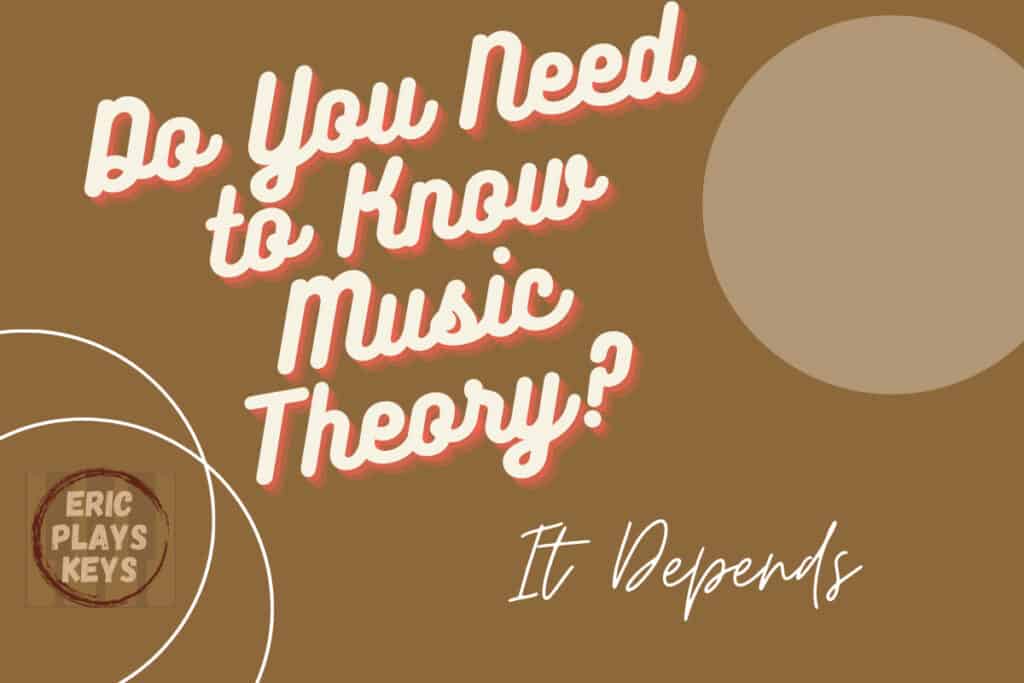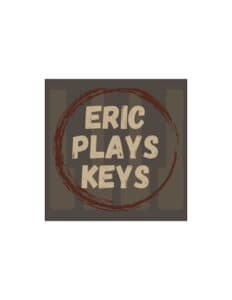
Learning to play an instrument is not easy, so it’s common for students to wonder if they can lighten the load by skipping music theory studies. In reality, the unique situation of each musicians can be used to determine if music theory is necessary.
Musicians do not need to know music theory in order to play their instrument, although music theory studies can help. The musician’s instrument, genre, and goals will determine how helpful music theory will be, if at all.
Every musician’s situation and goals are different, and so everyone requires music theory to a different degree. In this article, I’ll expand on what circumstances that music theory applies, and how to identify when it’s not necessary.
Your Musical Needs Dictate What Music Theory You’ll Want
Music theory is a broad subject, and contains many subcategories that define and characterize specific aspects of music. Many of the subcategories overlap and apply to almost all music, and many are niche. Because of this, the music theory knowledge you’ll want to have depends on your musical interests.
Unless you play several diverse genres of music, multiple instruments, and have highly variable musical goals, you don’t need to study every topic in music theory. It’s perfectly ok to pick and choose the subjects that apply most to you, especially if you have clarity on the scope of your musical goals. The table below outlines some common situations that musicians may find themselves in, and identifies what music theory topics they may benefit from.
| Piano/Keyboard Player or Guitar Player | Chords and harmony – These are the only two commonly played instruments that can play multiple notes at the same time, so you can expect them to have to handle the chords. |
| Drummer | Rhythms – As long as they stay within the beat and the structure of the song, drummers get to add rhythms of their choosing. Names of beats– Some beats might include latin, swing, rock, reggae, shuffle, four to the floor, etc. |
| Singer | Names of keys – Singers will want to know how to communicate what key they feel comfortable singing in with the band |
| Wind Instrument Player | Articulations – Wind instruments like a trumpet have to carefully control notes they play with their airflow and embouchure |
| Jazz Musician | Jazz harmony – Chords are constructed with additional notes in jazz, when compared with other genres. Improvisation – A solid understanding of chords and harmony is needed to generate jazz language on the fly. |
| Classical Musician | Latin terminology – Classical pieces contain instructions on how to play tempo, articulation, and phrasing using latin terminology. |
| Pop Musician | You can probably get away with not knowing a single thing about music theory! |
| Music Teacher | You probably need to know as much as you can! It doesn’t look good when students ask questions and don’t get answers. |
| Composer | Everything – This can include melody, harmony, music notation, rhythm, and more, since composers are in charge of everything. |
| Producer | Instrumentation – It will help to know the various instruments and electronic sounds, their functions, and how they can be combined effectively in recordings. Audio engineering – It’s also important to use the correct techniques to balance various sounds and ensure listeners’ attention is attracted to the correct parts of the music |
| Gigging Musician | Slang – Musicians will use lots of shorthand language to communicate quickly when playing live, including words describing forms, hits, and chords. |
Can You Get By With No Music Theory Knowledge?
You can definitely get by without knowing any music theory. Personally, I’d recommend this approach only to those who really don’t enjoy studying music theory material. A little bit of the theory can go a long way in helping you learn to play your instrument faster, so I’d be wary of this approach. However, it’s important that music is fun, so it’s ok to avoid the subject if you truly hate it.
Playing by ear and intuition is the alternative to learning music without music theory. These aspects of musicianship are essential for everyone, including masters of music theory, so they can be sufficient to create great music.
Playing by ear refers to listening to songs and copying what you hear. It can be difficult at first to get the correct notes, but gets easier with time. The ‘guess and check’ method is really the only way to get the notes right – listen to the recording, guess what note you’re hearing, play it, and see if it matches. If it sounds low or high, adjust accordingly.
Your intuition can also guide you to the correct notes to play, as well as rhythms, phrasing, and other musical elements. The best way to develop your intuition is to listen to more music! Over time, you’ll start to absorb the musical elements you hear and they’ll find their way into your playing organically. This is a very slow process – be patient!
The important caveat here is that although it’s possible to learn to be a great player without a drop of music theory, it’s likely to be more difficult. A little bit of knowledge on basic music theory topics will go a long way. When you know what the names of the chords and scales are, basic rhythms, and common terminology, you’ll be able to recognize patterns in the music you learn. This can inform your playing, and create shortcuts for you because you won’t need to re-learn the same basic building blocks over and over again.
You Don’t Need Music Theory, But You Might Want It
Again, there’s some tangible benefits to knowing some music theory if you’re willing to learn. I’ll use the analogy of a writer – you can become a great writer without knowing the rules of grammar, or basic writing styles and conventions. However, those who study these topics will be more informed when they make their writing decisions. Even knowing what an analogy is may prompt writers to use them more often, and correctly. It’s not that a writer couldn’t come up with an analogy based off their own intuition, but it’s less likely.
This leads into an idea many call ‘a thing’. In conversation, when bringing up a new idea, concept, or item in pop culture, someone may ask you ‘is that a thing?’. Basically what they’re asking is if the concept is shared and recognized by others, proving that it is valid and functional. Music theory defines commonly occurring patterns and ideas in music, so a musician can rest assured that a musical element is a ‘thing’ if it’s covered by music theory.
By knowing what elements are ‘a thing’, a musician can more effectively play and communicate to the audience because they are aware of tried and true musical elements. For example, knowing that an authentic cadence is a ‘thing’, a musician can know that when they play a 5 chord followed by a 1 chord, it will sound good to the audience.
